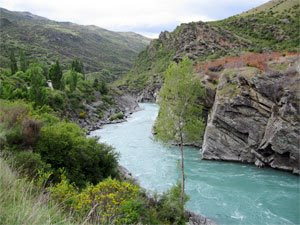
Once upon a time, an old man and young boy were traveling with a donkey. As they walked alongside the donkey, who was carrying their possessions on its back people remarked, "What a pair of fools. They are walking when they have a perfectly good donkey to ride!" So the old man lifted the little boy upon the donkey to ride and after a while people commented at the sight, "How can that lazy boy be riding on the donkey while making that old man walk." So the boy got off the donkey and let the old man ride, but again people commented, "How can that lazy man ride the donkey while letting that poor child walk." So both the old man and the boy got on the animal and rode together. But the remarks did not stop, "Look at those two. Both of them riding on that poor donkey and having it carry all their possessions at the same time. How cruel!!"
So now the old man and the boy didn't know what to do. After a while, they cut down a pole, tied the donkey's feet to it, and each carried one end of the pole on their shoulders, carrying the donkey as they went. By then people were really laughing at them. When they crossed over a bridge, the donkey loosed one of its feet and kicked the boy. The boy dropped his end of the pole and the donkey fell into a the river. And with his feet tied drowned before they could rescue him. They had lost their donkey and most of their possessions. So the old man said to the boy, "You know son, I guess sometimes if you try to please everybody you please nobody. So you just have decide what is right."
Why am I telling one of Aesop's Fables on this blog?
Because I think it is a relevant message to anyone who has ever taken or considered taking a stand on a controversial issue.
In particular when you decide to openly oppose a war in any society charges of a lack of patriotisim, of undermining your country, and harming the troops are predictable reactions from some members of society. In many societies, sadly including our own since the Vietnam War, the idea that protesters somehow stabbed the troops in the back and caused the war to be lost is very deeply woven into the culture.
Whatever position you take on a war some folks aren't going to be happy with it. And the people who dislike what you say can include civilians, members of the miltary, veterans of that war, veterans of another war, people who lost family member, immigrants who just moved to the US, and so on. This is unavoidable regardless of whether your position on the war is for or against. Indeed among Iraq Veterans there are already both anti-war organizations such as Iraq Vets Against the War, and the pro war Vets For Freedom. This was also true of the Vietnam War. So the common imperative to "Support the Troops" cannot provide any answer as to what you should do.
Either way you aren't going to please everyone. And if you think you can avoid that simply by keeping quiet think again. If the war is badly remember by history, as the Iraq War probably will, then people who might have had their doubts but kept quiet might find that younger generations may wonder why they didn't say something during the war. When it mattered.
Furthermore, I'm afraid Bush, Cheney, and Rove planned to blame you for Iraq regardless of what position you take. It was in the cards from the beginning.
So a controversial war is by nature a situation where you CAN'T please everyone no matter what you do.
But you can do what your conscience dictates. You can and must think for yourself. Do you homework. Learn as much as you can. Come to your own conclusions. Make your own decision about what is right and don't be afraid to say it openly-if politely!!. A democracy asks nothing less of its citizens.
Say Goodnight Readers!!







